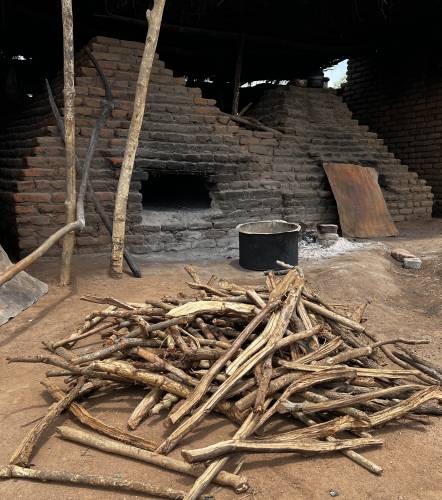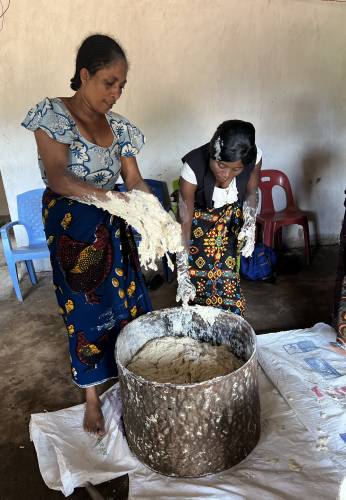Women owned and operated bakery transforms lives in Malawi
By Fletcher Padoka | Kasupe Ministries Malawi

Emma Abulahamu (center), Tinenenji Kalamba (right), and a friend display the finished product before they venture out for selling. Photo courtesy of Kasupe Ministries Malawi.
In 2022, Kasupe Ministries, with the support of funding from the Presbyterian Hunger Program, installed the Kasupe Women’s Bakery in Kasupe, Malawi. The goal was to create a women owned and operated bakery that would address the local shortage of nutritious and healthy bread by producing and selling freshly baked bread, mandazi (African donuts), cookies, and biscuits baked from locally produced roots (cassava), tubers (sweet potatoes), bananas, maize/corn, millet, rice, groundnuts, eggs, and milk. The bakery not only employs local women as bakers, but also bolsters the production of local farmers and strengthens the local economy.
109 women are currently employed by the bakery and are shareholders in the business, so they are essentially “self-employed.” Most of the women have been widowed by HIV/AIDS and many of the women are living with HIV themselves. Before the bakery was installed, these women had problems raising enough income to pay for food, hospital bills, and other household expenses. These families also have very little land available to them for farming, making it difficult to produce enough food to feed the family and earn extra income.
For decades, life for most of Kasupe’s women was a journey of perils with no end in sight. None of the women could manage to provide decent meals to their families on a daily basis. The resulting malnutrition further depleted their meager financial resources to pay for medicines and sometimes women would have to stop work to take care of the sick within their households, or to take rest when they themselves fell ill. But even when healthy, there were very few opportunities for income generation within the rural villages near Kasupe.
These women, while they have made much progress, they have not yet escaped poverty. They each currently earn about $11/month which is only $0.36/day – still far from the $1.90/day that the United Nations suggests is necessary for a decent life. However, the increase in income is still making a huge impact.
Emma Abulahamu, a mother of three, is now able to buy school uniforms and books for all her children. The children are thankful for their mother’s bakery business because no teacher is “chasing” after them for lacking uniforms.
Alinafe Makasu, a widower with two children, is able to afford the other medicines needed in addition to her anti-retroviral drugs—a feat that was a tall order before the Bakery was established. “I don’t buy anything with my earnings from the Bakery, every penny goes to the HIV treatment, and this bread program has given me hope that I will be alive for many years to come..

Alinafe Makasu (right) and Tinenenji Kalamba (left), the Kasupe Women’s Bakery chairperson, hold some of the bread produced at the Bakery as they prepare for sales. Photo courtesy of Kasupe Ministries Malawi.
Patuma Amidu, a single mother providing for a household of four, is now able to provide two meals per day, something that has alluded her for the past twenty years. “I have lived most of my life having one meal a day, but now I am able to have two meals because I use some of the skills I have learnt here to make money through other ventures. The money I earn here is not enough but the skills that the Bakery project has offered me are helping me a lot to provide for my household, better than some who have husbands by their side.”
Tinenenji Kalamba is 42 years old, born in a family of 11 children. She dropped out of school at age 12. By the age of 20, she was already a widow with three children. To make matters worse, she was diagnosed as HIV+, which was a death sentence in the early 2000s. She left the village for the city of Blantyre, but life continued to be tough, and she married a second time which left her yet again widowed and this time with three more children all of whom were born with HIV. She returned to her home village in the Kasupe area in 2010 where she tried her best to raise her six children. Tinenenji lacked enough food and money. She had trouble affording HIV medications for herself and 3 of her children. And her house was in disrepair and leaked water whenever it rained.
Then came The Kasupe Women’s Bakery and Value Addition Centre. Tinenenji was one of the first to register for the group. When the time came for leadership positions, Tinenenji volunteered to lead. “I desperately wanted to lead,” she told us, beaming with a lot of joy. “I had noticed that this project had potential and I wanted to be at the forefront—I can’t lie, I also wanted to benefit a lot, I thought I needed more of the money than the rest,” she added quickly, ready to get back to work.

The ovens of the bakery with a pile of wood for the fire. Photo courtesy of Kasupe Ministries Malawi.
Tinenenji continued, “The Kasupe Women’s Bakery and Value Addition Centre hasn’t given me everything, but it is putting food on the table, and I know things will get better in 2023.” At the end of each month, Tinenenji gets an average of $11, and this money is enough to put food on the table for the next four weeks. Her involvement with the Bakery has also given her an opportunity to cultivate customers for her personal business ventures. “I have 28 local chickens, 17 pigeons, in addition to my charcoal selling business,” she revealed to us. The charcoal she sells is bought from the Bakery.
The future for the bakery and the women of Kasupe is full of promise. In the coming months, the Bakery will double production capacity and could be generating at least $20/month for each shareholder. Kasupe Ministries Malawi, and all the women who are involved in this income generation venture are very thankful to the Presbyterian Church (USA) for funding this poverty alleviating program.
The work of the Presbyterian Hunger Program is possible thanks to your gifts to One Great Hour of Sharing.
